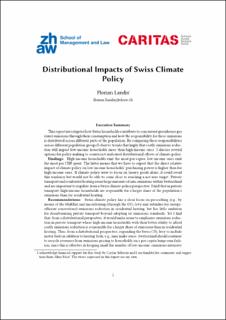Please use this identifier to cite or link to this item:
https://doi.org/10.21256/zhaw-30465| Publication type: | Working paper – expertise – study |
| Title: | Distributional impacts of Swiss climate policy |
| Authors: | Landis, Florian |
| et. al: | No |
| DOI: | 10.21256/zhaw-30465 |
| Extent: | 37 |
| Issue Date: | Apr-2024 |
| Publisher / Ed. Institution: | ZHAW Zürcher Hochschule für Angewandte Wissenschaften |
| Publisher / Ed. Institution: | Winterthur |
| Language: | English |
| Subject (DDC): | 363: Environmental and security problems |
| Abstract: | This report investigates how Swiss households contribute to concurrent greenhouse gas (GHG) emissions through their consumption and how the responsibility for these emissions is distributed across different parts of the population. By comparing these responsibilities across different population groups I observe trends that imply that costly emissions reduction will impact low-income households more than high-income ones. I discuss several options for policy making to counteract undesired distributional effects of climate policy. Findings: High-income households emit the most per capita, low-income ones emit the most per CHF spent. The latter means that we have to expect that the direct relative impact of climate policy on low-income households’ purchasing power is higher than for high-income ones. If climate policy were to focus on luxury goods alone, it could avoid this tendency but would not be able to come close to reaching a net-zero target. Private transport and residential heating cause large amounts of GHG emissions within Switzerland and are important to regulate from a Swiss climate policy perspective. I find that in private transport, high-income households are responsible for a larger share of the population’s emissions than for residential heating. Recommendations: Swiss climate policy has a clear focus on prescribing (e.g., by means of the MuKEn) and incentivizing (through the CO2-levy and subsidies for energy efficient renovations) emissions reduction in residential heating, but has little ambition for decarbonizing private transport beyond adopting EU emissions standards. Yet I find that, from a distributional perspective, it would make sense to emphasize emissions reduction in private transport where high-income households with their better ability to afford costly emissions reduction is responsible for a larger share of emissions than in residential heating. Thus, from a distributional perspective, expanding the Swiss CO2-levy to include motor fuels in addition to heating fuels, e.g., may make sense. Switzerland should continue to recycle revenues from emissions pricing to households on a per-capita lump-sum fashion, since this is effective in keeping small the number of low-income, emissions-intensive households that are at risk to experience hardship. The literature on principle–agent problems suspects split incentives between landlords and tenants in the case of installing expensive but efficient heating technologies in rented dwellings. This risks that households without a choice in their heating system pay the CO2-levy without being able to reduce emissions other than by not heating their home to their needs. Switzerland should make sure that renters and low-income credit-constrained households have access to low-carbon heating technology. Also the wide heterogeneity in emissions per household suggest that completely decarbonizing their consumption will be particularly expensive for some few households. Social security and non-governmental social safety nets have to be prepared for recognizing such hardship cases and for supporting them. |
| Further description: | I acknowledge financial support for this study by Caritas Schweiz and the Swiss Society for the Common Good SSCG and I am thankful for comments and suggestions from Aline Masé. The views expressed in this report are my own. |
| URI: | https://digitalcollection.zhaw.ch/handle/11475/30465 |
| License (according to publishing contract): | Licence according to publishing contract |
| Departement: | School of Management and Law |
| Organisational Unit: | Center for Energy and Environment (CEE) |
| Appears in collections: | Publikationen School of Management and Law |
Files in This Item:
| File | Description | Size | Format | |
|---|---|---|---|---|
| 2024_Landis_Distributional-impacts-of-Swiss-climate-policy.pdf | 519.73 kB | Adobe PDF |  View/Open |
Show full item record
Landis, F. (2024). Distributional impacts of Swiss climate policy. ZHAW Zürcher Hochschule für Angewandte Wissenschaften. https://doi.org/10.21256/zhaw-30465
Landis, F. (2024) Distributional impacts of Swiss climate policy. Winterthur: ZHAW Zürcher Hochschule für Angewandte Wissenschaften. Available at: https://doi.org/10.21256/zhaw-30465.
F. Landis, “Distributional impacts of Swiss climate policy,” ZHAW Zürcher Hochschule für Angewandte Wissenschaften, Winterthur, Apr. 2024. doi: 10.21256/zhaw-30465.
LANDIS, Florian, 2024. Distributional impacts of Swiss climate policy. Winterthur: ZHAW Zürcher Hochschule für Angewandte Wissenschaften
Landis, Florian. 2024. “Distributional Impacts of Swiss Climate Policy.” Winterthur: ZHAW Zürcher Hochschule für Angewandte Wissenschaften. https://doi.org/10.21256/zhaw-30465.
Landis, Florian. Distributional Impacts of Swiss Climate Policy. ZHAW Zürcher Hochschule für Angewandte Wissenschaften, Apr. 2024, https://doi.org/10.21256/zhaw-30465.
Items in DSpace are protected by copyright, with all rights reserved, unless otherwise indicated.